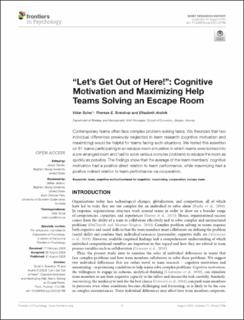| dc.contributor.author | Schei, Vidar | |
| dc.contributor.author | Sverdrup, Therese E. | |
| dc.contributor.author | Andvik, Elisabeth | |
| dc.date.accessioned | 2020-12-22T08:58:45Z | |
| dc.date.available | 2020-12-22T08:58:45Z | |
| dc.date.created | 2020-09-02T08:23:05Z | |
| dc.date.issued | 2020 | |
| dc.identifier.citation | Frontiers in Physiology. 2020, 11 1-7. | en_US |
| dc.identifier.issn | 1664-042X | |
| dc.identifier.uri | https://hdl.handle.net/11250/2720701 | |
| dc.description.abstract | Contemporary teams often face complex problem-solving tasks. We theorized that two individual differences previously neglected in team research (cognitive motivation and maximizing) would be helpful for teams facing such situations. We tested this assertion on 81 teams participating in an escape-room simulation in which teams were locked into a pre-arranged room and had to solve various complex problems to escape the room as quickly as possible. The findings show that the average of the team members’ cognitive motivation had a positive direct relation to team performance, while maximizing had a positive indirect relation to team performance via cooperation. | en_US |
| dc.language.iso | eng | en_US |
| dc.rights | Navngivelse 4.0 Internasjonal | * |
| dc.rights.uri | http://creativecommons.org/licenses/by/4.0/deed.no | * |
| dc.title | “Let’s get out of here!”: Cognitive motivation and maximizing help teams solving an escape room. | en_US |
| dc.type | Peer reviewed | en_US |
| dc.type | Journal article | en_US |
| dc.description.version | publishedVersion | en_US |
| dc.source.pagenumber | 1-7 | en_US |
| dc.source.volume | 11 | en_US |
| dc.source.journal | Frontiers in Physiology | en_US |
| dc.identifier.doi | 10.3389/fpsyg.2020.02196 | |
| dc.identifier.cristin | 1826619 | |
| cristin.ispublished | true | |
| cristin.fulltext | original | |
| cristin.qualitycode | 1 | |

